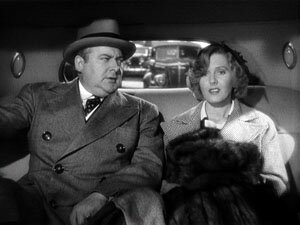When a an expensive fur coat falls on her head, Mary Smith’s life of scraping together enough for food and rent turns upside down. She suddenly finds herself in a world of wealth, as she’s mistakenly perceived of as the mistress of Wall Street banker and tycoon, J.B. Ball.
Easy living was never so hard — or muddled and funny.
Easy Living (1937)
Directed by Mitchell Leisen
Several things distinguish Easy Living but the two that stand out for me are Preston Sturges and Jean Arthur. While the movie isn’t directed by Sturges (it was directed by Mitchell Leisen), he wrote the screenplay and does it ever show.
How do you know a movie is a Preston Sturges movie? Everybody falls down, or at least they seem to. There are so many pratfalls here you could easily lose count.
While a screwball comedy, there is almost always a strong slapstick element in Sturges’ movies, particularly the earlier ones.

His movies are distinguished by their comedic brilliance. Much more than slapstick, they also have a high level of verbal wit which here, in Easy Living, is often from Jean Arthur as Mary Smith. Arthur delivers her lines with aplomb — something quite amazing given how insecure she was as an actress.
Like Cary Grant, her high level of insecurity is in contrast with the high degree of confidence that comes through in her on screen performances.
Arthur had more in common with Grant than insecurity, however. They also shared a desire to be free of the whims of studios and be independent — though Grant was, I think, more for financial reasons and Arthur more for personal.
In the case of Easy Living, John Oller in his biography Jean Arthur:The Actress Nobody Knew, says:
“… Ever since Mr. Deeds [Goes to Town], Arthur was finding her best roles and films on loanout from Columbia, and she was beginning to question the value of her affiliation with her home studio. She particularly resented Columbia’s ability to make money by loaning her to other studios for substantially more than her weekly salary, while she saw none of the profit. She also detested being told when, where and how often she had to work … Now that she was approaching forty, she found the experience of having to carry large segments of each film a physical and emotional drain.
“Deciding enough was enough, Arthur suddenly and unilaterally declared her independence. In March 1937, she signed with Paramount for her next film, called Easy Living …”
Arthur was feisty, independent, insecure and had fragile physical and emotional health. She was a bundle of contradictions but perhaps it’s the conflict of all those contradictions that made her so good on screen.
Easy Living was not the end of her studio struggles. She was at war with Harry Cohn — she even went so far as to plot to kill him, which she related to friends in blase style.
Cohn, for his part, was doing everything he could legally and (as court decisions would later state) sometimes not so legally to keep Jean Arthur in line.
There is yet one more thing Jean Arthur and Cary Grant had in common: timing. Arthur’s timing is dead on in Easy Living and much of what is really funny and holds an audiences’ attention resides in that.
There is, for example, the scene where she and an extraordinarily youthful Ray Milland go to sleep together then … one of Arthur’s eyes opens. Then, she sits up. As the short sequence plays, you see every thought cross her face as it is thought.
And yes, the movie also stars a young Ray Milland. He had been in a number of movies prior to this one, but a certain rawness still comes across. While his performance is suitable for the kind of movie this is, I found he lacked the naturalness that he would later mature into.
There is also Edward Arnold brilliantly playing the role he played so many times — the gruff, money-focused businessman. (See You Can’t Take It With You and Mr. Smith Goes to Washington.) He’s the one who throws the fur coat off a balcony that lands on Arthur initiating everything in the movie. (He also begins the movie taking more than a few pratfalls.)
The movie is also peppered with wonderful characters from its supporting cast, one of the load-bearing beams of great screwball comedies.
Easy Living is a wonderful comedy, one that for me is founded on one of Jean Arthur’s best performances and the pervasive Preston Sturges influence.
It mixes slapstick, romance and even another subtle Sturges touch, social awareness — the vacuous, self-absorbed rich and the hard-working, decent poor.
This is a Depression-era film and this contrast is common in the comedies of the 1930s. See My Man Godfrey, for example.
It’s a movie well worth seeing, and more than once. I know I will.


